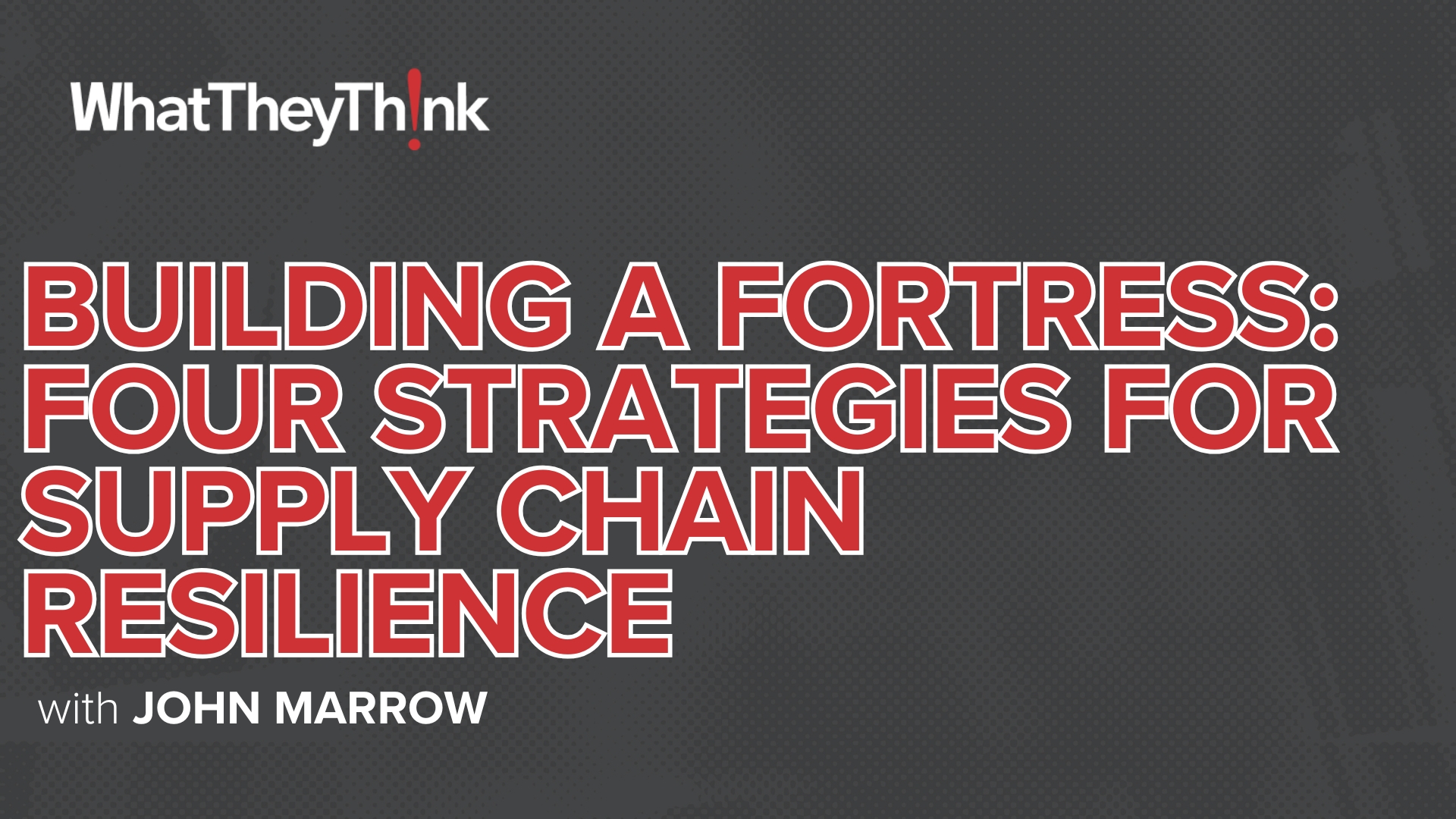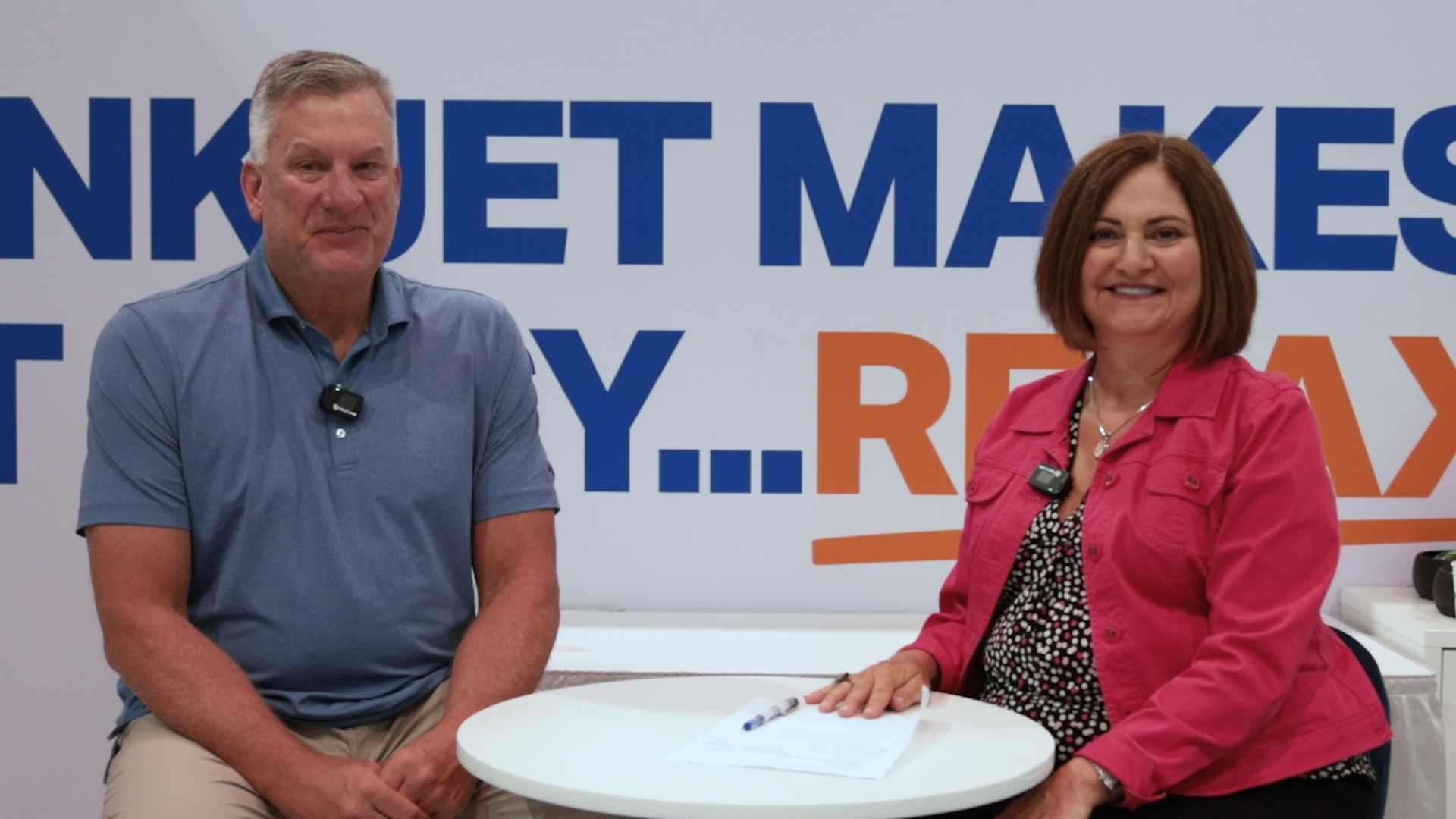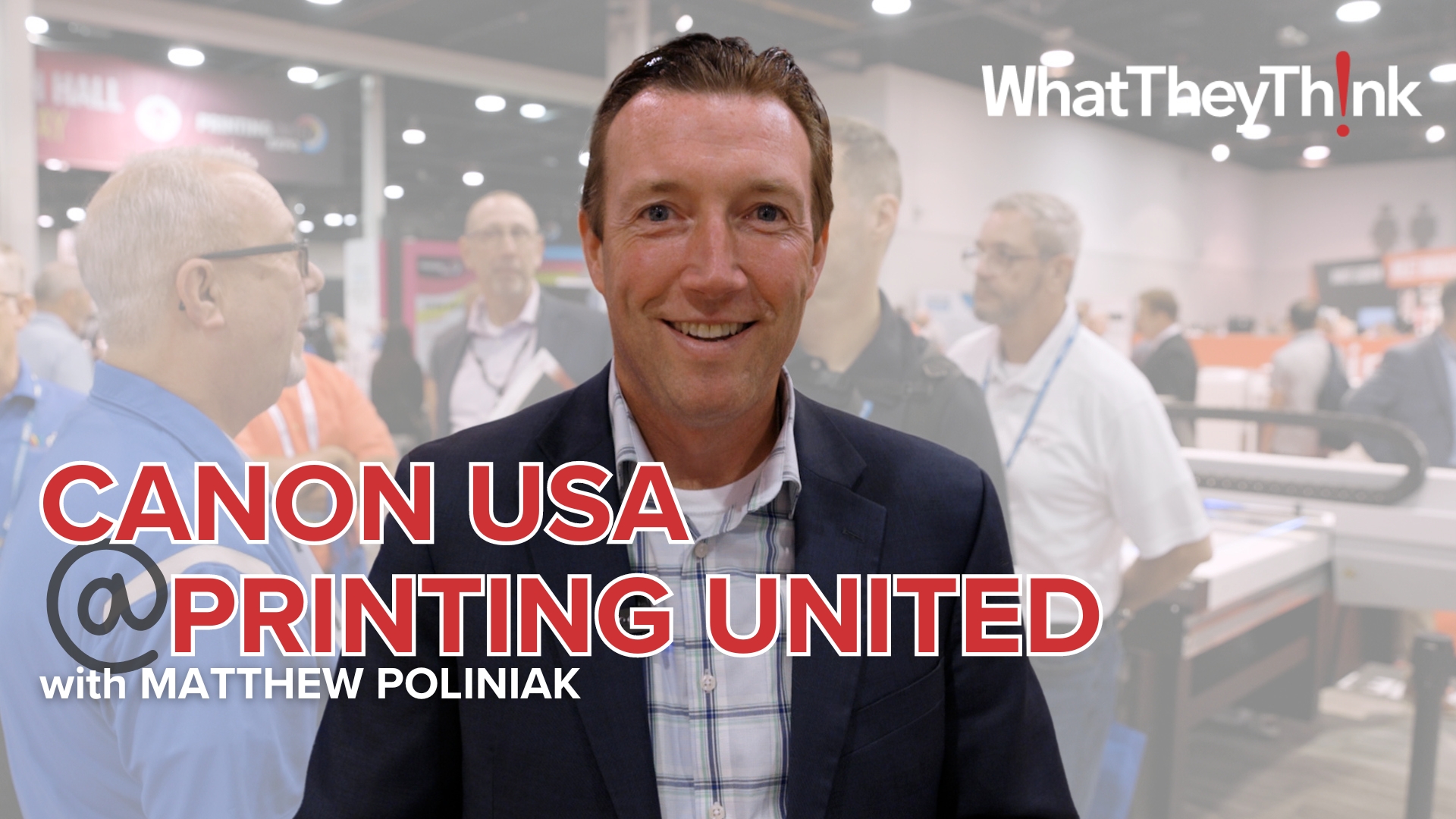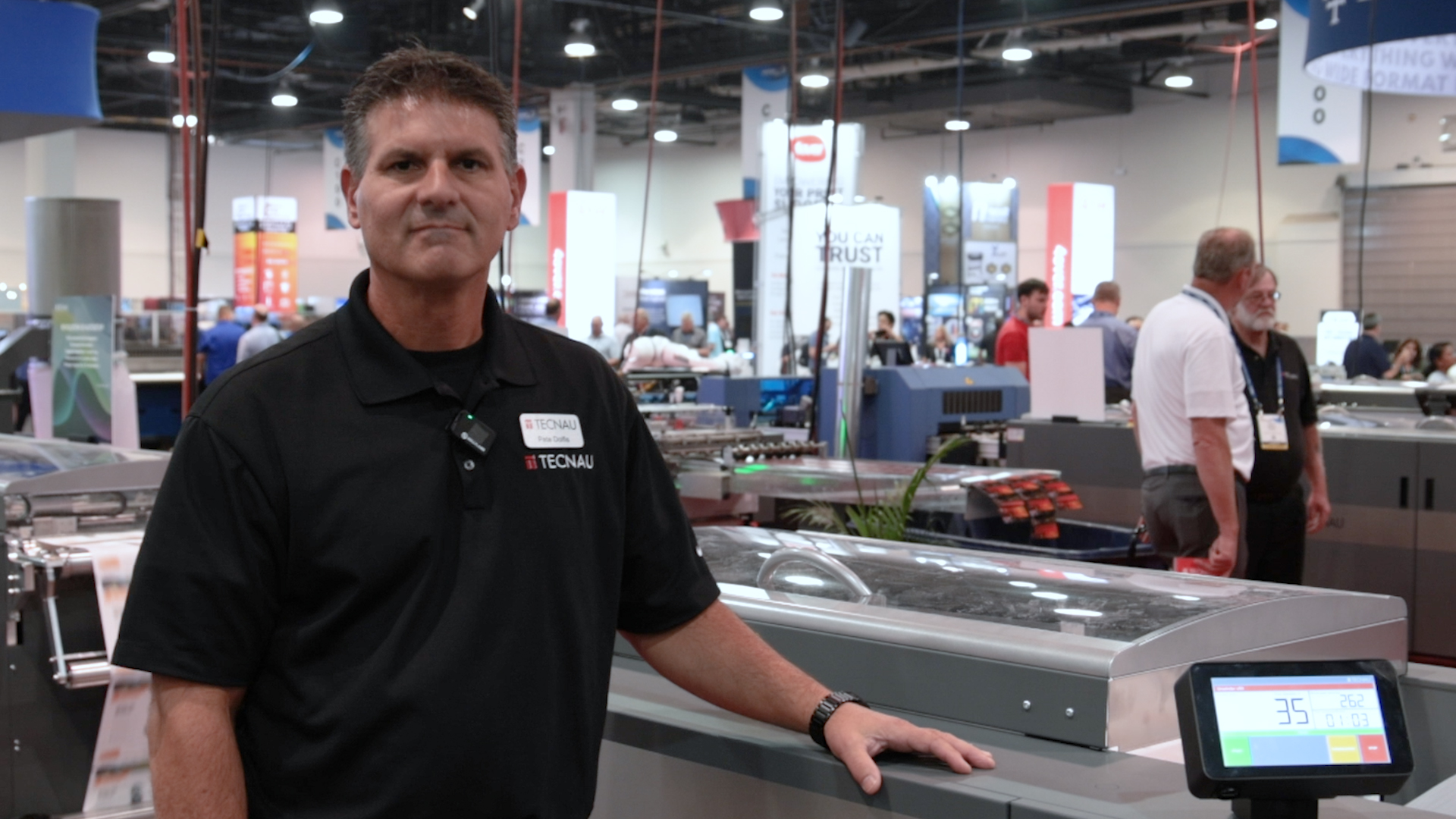Commentary & Analysis
Displaying 6201-6300 of thousands of articles
Insight You Need. Analysis You Trust.
Get the trusted insights you need to understand our evolving industry and emerging trends. Become a Premium Member.
Felt and Wire: Mohawk Creates Buzz in the Designer Community
Mohawk Paper Mills Create Buzz in the Designer Community Do a Google search for “felt and wire” and most of the hits on the first two pages refer to Mohawk’s recently launched Felt and Wire blog, and even more recently launched Felt and Wire Shop.
A Flood of E-Books?
E-books are not books, they're e-commerce sites that let you read books. Small businesses are cutting their ad budgets but increasing their digital spending. What the government statisticians giveth one week, they taketh away the next week. The Road Warrior thinks you shouldn't buy Windows 7, but buy a new computer instead, unless you're a Linux geek like he is. You know you're getting old when Patty Duke is making Social Security commercials and you can remember a time when the price of a color scanner had a comma, and there were five zeroes in the price.
From ampersands to interrobangs
In the 3rd century B.C. Aristophanes of Byzantium invented a system of single dots that separated verses and indicated the amount of breath needed to read each fragment of text aloud. The different lengths were signified by a dot at the bottom, middle, or top of the line. For a short passage (a komma), a dot was placed mid-level. The name came to be used for the mark itself instead of the clause it separated.
Graphic Design Goes Mobile? iPhone Apps for Creatives
Whilst a primary component of the Creative Corner will be hardware and software reviews, I need to say a word or two at the outset about star ratings. It’s common in just about any review you read to see a product’s quality expressed as some number of stars, computer mice, or some other appropriate icon—or perhaps even an upward- or downward-pointing thumb, for those who like their ratings decidedly binary. (I always liked the San Francisco Chronicle’s movie review ratings which feature a cartoon viewer either falling out of his chair agog with enthusiasm, falling asleep bored, or something in between.)
Implementing Lean Manufacturing into Newspaper Production Operations - Part B
Newspapers are a dynamic medium, and the development of newspaper products is continuously changing. The paper has been around for centuries, but today there are a myriad of alternatives for reading the news. In addition to changes in circulation, demand for quality, volume, price, and distribution has changed considerably. The newspaper as a medium must change to meet these demands.
“Recession, Schmecession,” says EFI’s Guy Gecht
At the EFI press conference at Print 09, CEO Guy Gecht took a very different approach, using the “Recession, Schmecession” theme and tying a top ten attributes for success into the value of various EFI products. While we won’t be talking about the products specifically here, we thought his top ten attributes for success were worth delving into and took the opportunity to speak to Guy directly, hoping he would share his thoughts with our readers. Herewith the results!
Not Every Day is Easy When You're in Recovery
The bumpy bottom is just that. When things improve, how do we know it's for real? If we just consult our lucky numbers, we may feel good. But we have to look past the attractiveness and take an objective look at what these lucky numbers really mean. If lucky numbers aren't lucky, then the real numbers should be better. Real numbers can be just as murky, especially when they deal with employment. Could Dr. Joe be wrong about stagflation? He takes a new look and explains it all.
Forget Doing "More With Less": Older Workers Help Companies Accomplish "More with More"
Among the clichés that have been touted throughout our recent economic decline is the demand that people learn to “do more with less”. On the contrary, with the following article PrintLink would like to demonstrate the advantages of “doing more with more” when it comes to hiring older employees.
Introducing the Creative Corner
Welcome to the first installment of WhatTheyThink’s “Creative Corner,” a weekly feature/column targeted toward graphic designers (print, Web, and beyond) and other creative professionals. In this space each week, I’ll be presenting business tips, hardware and software reviews, sales and marketing strategies, emerging technologies, and graphic communications and media trends.
Mobile-to-Print: It’s Time for Print Service Providers to Figure it Out!
Mobile devices are the one electronic device that most of us carry at all times. These devices are with their owners for more hours of the day than personal computers, TV sets, magazines, or radios. A recent Synovate survey provided clear evidence of how much people depend on their phones. Three-quarters of total survey respondents—including 82% of Americans—never leave home without their phones, and 36% of people around the world (42% of Americans) go as far as to say that they can’t live without their cell phone.
The Rise and Fall of Mallard Press Part 2
The recent closure of Mallard Press caught our eye. While I don’t know Bob Gay or the company personally, a review of its web site revealed a company that appeared to be on the right track and making the right investments for the future. Bob Gay was kind enough to speak frankly with us about the factors that led to the demise of the company.
Xerox iGen4 Update: Advances made in Packaging and Photo Markets
Last year at drupa Xerox Corporation introduced a number of new products, two of which I want to cover in this article. The first is the Xerox iGen4 press and the second is the Xerox Automated Packaging Solution for the digital printing and production of folding cartons for packaging. Today, these two products make up the Xerox Automated Packaging Solution powered by Stora Enso Gallop. The automated digital system can print a variety of personalized packages in multiple languages. The packaging system can quickly switch from one job to the next, providing the flexibility needed in today's global and rapidly changing marketplace.
The Rise and Fall of Mallard Press
The recent closure of Mallard Press caught our eye. While I don’t know Bob Gay or the company personally, a review of its web site revealed a company that appeared to be on the right track and making the right investments for the future. Bob Gay was kind enough to speak frankly with us about the factors that led to the demise of the company. Perhaps there are lessons here for others in the industry who may be teetering on the edge or worried about the future.
Planning Often Gets in the Way of Running Business Well
I finally got to one of those books in my “to read when I find some time” pile, Strategy Bites Back, published in early 2005. The principal author is Henry Mintzberg, whose Rise and Fall of Strategic Planning, published in 1994, skewered, barbecued, and devoured the strategic planning process quite mightily. This newer book does so in a far more entertaining manner. It is a collection of short articles and excerpts craftily assembled for one purpose only: to make one think. I recommend reading it, and here’s why.
The State of U.S. Printing Associations -- Part Deux
The reaction to the first article, both at Print CEO and personal communication, has been overwhelming. Editors, consultants, affiliate managers and staff, educators, and, most of all, printers support merging the two commercial printing associations. There has been no word from NAPL or PIA. Why am I expressing these opinions? Because no one else will.
It’s A Perfect Storm for Marketing Services…and the Boat is Rocking!
For the past 3-4 years, I have talked about the emergence of the Marketing Service Provider (MSP). This year, the market will see the convergence of three realities that have been building in strength over the past decade. First, today’s consumers are “always on”—they enjoy more connectivity and control than ever before. Second, the media environment has become more complex than any marketer could have imagined a mere 10 years ago. Third, these economic times have created an intense demand to demonstrate ROI. All three of these factors create a perfect storm for MSPs… and the boat is rocking!
Océ Home of Color
Océ has for a long-time been a company that had excellent communication with its clients. For many years it has run an annual event, the Océ OpenHouse. This was a multi-day event at which Océ’s customers and prospects were invited to attend, plus a large number of analysts and press also attended. It was claimed that this was the largest digital printing fair in Europe.
I Said the Bottom Would be Bumpy
Friday's unemployment report was very discouraging, but news reports weren't discouraging enough. That doesn't mean there isn't good news: recent manufacturing data have some signs of encouragement. The most encouraging thing would be the acknowledgment that businesspeople taking risks is what will ultimately grow the economy, and nothing else. Chaos is good... especially if there are 30 days of it.
Remember DAX and Sprockets?
I recently ran into Patrick White, an industry veteran I had not seen a long time. In the late 1990’s, Patrick was regarded as one of the industry’s leading prepress consultants and was the recipient of NAPL’s 1998 Technical Leadership Award. In 1995, he founded Digital Art Exchange, known as DAX, as an integrator of ISDN (remember that??) and related technologies for prepress connectivity applications.
Strategic Business Networking: The Key to Survival in a Challenging Economy
NETWORKING is the single most powerful marketing tactic that can be used to accelerate and sustain success for any individual or organization. Networking is about making connections and building enduring, mutually beneficial relationships. Effective business networking is the linking together of individuals who, through trust and relationship-building, become walking, talking advertisements for one another. Nielsen's Global Online Consumer Survey found that a recommendation was the most important form of advertising. In fact, 90% of the 25,000 consumers surveyed reported that they trusted recommendations from people that they knew. Networking is designed to create “fans” and “friends” that would recommend you to others.
The Real Solution for Highest Quality Color Printing?
It is not very often one comes across what could be termed industry changing or breakthrough products. I believe what I am writing about today could be such a product. One subject that has exercised the brains of many of the best technical experts in the industry is that of screening. It is also a subject that has generated a great degree of income for the patent lawyers who work with this industry’s suppliers.
From Here the Vista(Print) Keeps Going Up
VistaPrint (VRPT) provides print and marketing services to more than 20 million customers, who spend an average of $33 per order. The company, recently ranked number 16 on the Fortune 100 Fastest Growing Companies list, has manufacturing facilities in Windsor, Ontario, and Venlo, Netherlands.
What's Up with the Economy?
Expectations often shape the perception of what are supposedly good data, and sometimes good data just are not what they are cracked up to be. Bad selling from memorized scripts could be handled by automatons. In some cases, that might be an improvement. Up-selling, when poorly done, is probably one of the aspects of sales that undermines confidence of buyers, especially first-time customers, making them unlikely to become second-time clients.
NAPL and PIA - and the state of American trade associations
Theodore De Vinne and less than 20 large American printers formed the United Typothetae of America in the late 1800s to provide a united front against the Typographical Unions’ demand for an 8-hour work day. UTA was formally organized in 1887 at a convention in Chicago attended by 68 delegates representing 18 master printer’s associations and 22 cities. Its purpose was “to develop a community of interests and a fraternal spirit among the master printers of the United States and Dominion of Canada and for the purpose of exchanging information and assisting each other when necessary.” The United Typothetae of America would become Printing Industries of America.
Education and Integration the Name of the Game at Print 09
Last week, Barb Pellow wrote an article on WhatTheyThink about Print 09 emphasizing that people came to the event with a purpose, and much of that revolved around education. She highlighted Executive Outlook and the conference sessions, as well as WhatTheyThink’s first-ever in-person educational event, the Print CEO Forum, along with the significant networking opportunities attending a show like Print 09 offers. I wanted to add to that perspective. I think many of the exhibitors also did an excellent job of providing in-booth educational opportunities. Of course, they were there to sell products and services, but they also put forth extraordinary efforts to emphasize the educational element.
Augmented Reality: A New Reality for Print
Augmented Reality (AR) is a field of computer science that involves combining the physical world with an interactive, three-dimensional virtual world. This may be a new term to some of you, but augmented reality makes print the ultimate in interactive media. It is perhaps the coolest use of paper I’ve seen in my lifetime, linking print with the technology that most people have on their desks. This might sound like science fiction, but augmented reality is here today.
So, How Was it For You?
Print’09 has now taken place. Unfortunately I was unable to be there but I have followed the event and comments about the event on a wide range of media. From this I have come to a number of conclusions, however I’m sure many attendees will not agree with what I concluded about the event.
When It Comes to Technological Progress in Print, There's No Such Thing as A"Recession"
As it happens, and as reported below, both KBA and AccessGroup fared rather well as exhibitors at Print 09. But, like every other exhibitor, they have no illusions about the fact that because their customers are struggling, they too will continue to struggle against a recession from which printing could be one of the last industrial sectors to emerge. That lingering economic drag was evident throughout the show, even when interest in its many technological advancements was keenest.
The Media Matrix: Rampant Opportunities for Printers, But Not Necessarily for Print
The matrix, not of the movie kind, puts it all together. The New Printer has New Opportunities, but requires the insights of the entrepreneur to dive into this confusing, changing, and ultimately rewarding marketplace.
Progress in Prepress Was a Keynote of Print 09
"Unscientific" has to be the word for our selection of exhibitors to write about in the aftermath of Print 09. Some are on the follow-up list because of pre-booked editorial appointments; others because of what we heard at media briefings during the show; and, in a couple of cases, because we were buttonholed by pouncing p.r. people as we moved past the booths, never intending to stop. But, at a show like Print 09, any reason for spending time with a vendor usually turns out to be a good one in terms of knowledge gained.
Paper, Paper, Everywhere!
Almost every guide to “going green” starts with paper. Use the right paper, use recycled paper, use both sides – in printing, it almost always starts with the paper. Several paper manufacturers (Mohawk Fine Papers, Neenah Paper and NewPage) and a number of paper merchants (including xpedx, Pitman, Eagle Ridge Paper, and others) had stands at Print09, and a representative of Appleton Coated caught me in the aisles.
PRINT 09: People with a Purpose
Like many of you who are reading this column, I just returned home from PRINT 09. While there was discussion about less traffic and participation on the show floor, my perspective is that people came to this year’s PRINT 09 event with a purpose. Justifying attendance in a difficult economy is challenging. I interviewed several individuals that participated in this year’s show. Unlike past years, these individuals came to the show with very explicit objectives.
Print 09: Litho, Litho Everywhere
To state the more or less obvious: Print 09 is an offset litho show. The rise of digital presses and a decline in the number of offset presses seen at the last three Graph Expos may have lowered the profile of conventional printing at the Graphic Arts Show Company (GASC) events somewhat, but it’s plain to see that the traditional ink-on-paper process is back in full force this year.
At Print 09, the Search for A New Beginning Is On
Bernhard Schreier has seen five economic crises since he joined Heidelberger Druckmaschinen AG in 1975, the first of them being the one brought on by the oil embargo that threw businesses around the world into a tailspin. He also recalls the stock market meltdown that the printing industry was only starting to recover from on September 11, 2001, before the awful events of that day threw it and the rest of the U.S. economy back into a state of shock.
It's almost time for PRINT 09
The last minute work is in effect. They are cleaning the booths and will roll the carpet along the aisles. Today a few thousand people will show us whether the recession is over -- at least for the printing industry. This is the first PRINT where the number of digital printers outnumbers the number of offset litho presses. It is the first print where inkjet is a dominant product being exhibited. It is the first PRINT where you can say that it is mostly digital in terms of workflow.
PRINT 09: What Tomorrow Brings
Tomorrow, PRINT 09 opens its doors at Chicago’s McCormick Place. An estimated 650 exhibitors and over 100,000 printers, publishers, typographers, converters, bindery and finishing specialists, prepress managers, desktop and electronic publishers, service bureaus, graphic designers, art directors, advertising professionals, publication designers, catalogue designers, and direct mail specialists are expected to come through the doors between September 11 and September 16. In an industry that is facing tremendous economic uncertainty, attendees are coming to PRINT 09 for more than participation in a tradeshow. They are seeking to discover what tomorrow will really bring.
A Message to Printers Attending Print 09
When we go to a major print show the major attraction for all of us is to spend time looking at the latest presses, whether these are conventional or digital. We love to see all the latest innovations on these presses to see just how efficient they are. Most printers yearn after the latest presses thinking how much they will improve their businesses with the productivity they can offer. I have to say that I too love looking at presses and there will be many new innovations in this area at Print’09 to attract the attention of visitors. There will be presses, some being shown for the first time in the US, in sizes from B3 through to VLF in the offset area. In digital many people will focus on the high-speed continuous feed presses, although two of the major suppliers, HP and Kodak, will not be showing these at the show.
A Few Hot Items to Check Out at Print 09
Print 09 is just around the corner, and exhibitors have been busy ensuring that they have the right mix of information, hardware, software, education and entertainment to make this an outstanding show.
Printing: where are we?
Draw a circle. Let us say that it represents all reproduction on paper and plastic substrates in the United States over one year. This includes printing on all devices, as well as copying. Now take a slice that represents about one quarter out. That is the volume of print that we lost to electronic alternatives: websites, PDF files, e-mail, etc. What is left is more or less the printing industry.
Implementing Lean Manufacturing into Newspaper Production Operations - Part A
Newspapers are a dynamic medium, and the development of newspaper products is continuously changing. The paper has been around for centuries, but today there are a myriad of alternatives for reading the news. In addition to changes in circulation, demand for quality, volume, price, and distribution has changed considerably. The newspaper as a medium must change to meet these demands.
The Workings of InnerWorkings: Still Positive in a Down Turn
We’re tracking on the ups and downs of public companies in the graphic arts industry to bring you regular profiles. Based on SEC filings, including quarterly and annual reports and proxy filings, as well as transcripts of earnings calls, we summarize key financial and business issues.
Equipment Leases: Beware of Possible Pitfalls
Equipment leasing offers many printing companies an affordable way to add today’s most requested capabilities to their service offerings, especially in today’s tight lending market. In addition to computers—far and away the equipment leased most frequently by businesses—printers are leasing such industry-specific equipment as presses, copiers, binders/cutters, colorimeters, and graphic cameras.
Print's New Entrepreneurial Opportunities
Last week, I discussed how the common wisdom benefits of print as enumerated as recently as 2006 and 2007, were crumbling because of several trends: l consumer Internet volume had passed business volume in 2008
A Sea Change in Printing Trade Shows?
Print 09 is shaping up to be an interesting show. The Graphic Arts Show Company has continued to shift the shape of the show based on changing industry dynamics. In case you haven’t visited the show site, it is being billed as myPRINT and has lots of great features to help attendees plan their show experience and navigate once they get there. The show company is even doing a cross-media campaign with mailings linked to personalized URLs. Visitors to the show site can customize their experience there as well, by specifying the type of visitor they are: commercial printer, in-plant printer, print buyer, etc., and being presented with the most relevant content.
Assessing job candidates beyond the technical skills
The goal of effective hiring is to maximize the return from your organization's human-capital investment and minimize the corresponding financial risks. And as a hiring manager, your task is to assess the potential of job candidates accordingly--in an astute, consistent, legal, fair, and humane manner. Of course, your first task is to determine how closely their technical (or “hard") skills relate to the technical requirements of the specific position you’re trying to fill. But the purpose of this article is to go beyond this initial assessment to discuss the more subtle aspects of candidate assessment and how to go about them.
A Focused Approach… It’s Essential to Growth!
In today’s challenging economy, a laser focus on the right target market is critical to success. These days, it takes more than leading-edge print and software technologies, products, or competitive prices to be successful. Companies need a focused business-to business-marketing strategy—a way to identify, segment, quantify, locate, and target their most important business-to-business customers and marketing prospects to reach their present and future goals.
In the Current and Emerging Era of Rampant Connectivity and Social Media, Where Do Print's Benefits Stand Now?
Back in 2006 I discussed the benefits of print as they stood at that time. Just think: last year, consumer Internet traffic surpassed business traffic; the iPhone was introduced in mid-2007 and the Kindle in 2008; social media did not exist for all practical purposes, and it now is 10 minutes of every hour consumers spend online. Add the downdraft of a worldwide recession, and you have listed every reason for every B2C, B2B, and all other organizations to re-cast their media plans and expectations. Here is where those some of those benefits now stand and the impact these forces have had on them; this is followed by some discussion about what this all means to our industry:
2009’s Top Ten Technologies for Survival
Each year for the last several years, I have taken the time to speak with Bill Lamparter, who coordinates Executive Outlook and the Must See ‘ems program for Graph Expo/Print, to learn more about what went into the Must See ‘ems panel decision about top technologies. This year was no exception.
Selling Mailing Services: Getting Started
A company's general intangibles have a very tangible impact on a company's valuation. Intangibles that are perceived as attractive can greatly enhance a company's value while negative or negligible intangibles can drag it down. To safeguard the worth of their businesses, NAPL Senior Vice President and Consultant John Hyde believes that graphic communications company owners should take proactive steps to protect their intangibles.
I Told You This Was Going to Happen
The news reports were so predictable. “The government's index of prices paid by consumers was unchanged in July from the previous month, but the closely watched inflation gauge recorded its largest over-the-year decline in 59 years.” That's the way CNN said it on Friday.
Printing Can be a Growth Market
Did you know that there is a company whose business is printing, that calls itself a printing company, but which is categorized as a high-growth organization by many organizations like Deloitte and Inc Magazine. The company is Mimeo.com and Deloitte identified it as the 25th fastest growing technology company in the New York region in 2007. Admittedly in 2006 it held the 10th spot on this list so its growth is slowing slightly. However since few companies that call themselves printers ever make it on any list for rapid growth there must be something special about Mimeo. Also very few printing companies have a list of investors including venture capital, private equity funds and innovate leaders in high technology.
Prologue to PRINT
The PRINT 09 event is only a few weeks away. A lot of printers are asking if it will be worth a trip. Yes, it will. They should publish Bill Lamparter’s Must-see’um and Worth-a-look lists in advance so youknow what to expect. I think there will also be a few surprises.
Books On Demand: The Book Publisher’s Dilemma, The Printer’s Dilemma and Opportunity
Not long ago, futurists believed that we would all be reading our books electronically by now—either on a computer screen or on a handheld electronic book. While I have yet to invest in a Kindle, quite a few of my favorite books are available in one electronic form or another. Even today, though, the reality is that I would rather curl up with the processed corpse of a tree than look at one more display screen.
TransPromo: A B2B Twist
Yesterday, InfoPrint Solutions and Sinclair Oil announced a TransPromo partnership that has a slightly different twist than the programs we normally hear about. Most of the TransPromo case studies tend to focus on business-to-consumer applications: Companies who place marketing or educational messages on statements, invoices, notifications and other consumer (customer) communications, reducing costs and often converting these mundane documents from a cost center into revenue generators.
Hyping a Recovery Doesn't Help Anyone, Until You Actually Have One
There is such a desire for good economic news that the press and others plant the good news at the top of the story and then hide the details in plain sight in paragraph 3, where they know no one will find it.
Ink Optimization Made Easy
At the recent IPA Technical Conference, Chromaticity introduced an ink optimization solution that, according to the company, reinvents the way color separations are produced, a process that has remained relatively unchanged for decades. WhatTheyThink spoke to Ian MacKenzie, Chromaticity’s Vice President of Marketing, to get more detail about this bold statement and what it might mean to the industry.
It’s About the Conversation… Not the Campaign
Over the past five years, my columns have espoused the value of variable data and integrated campaign management. While I continue to be a firm believer in relevant messaging and cross-media communications, I am quickly learning that in today’s wired and social media world, the market has taken yet another turn. Marketers are focusing on the importance of social media, and they will start seeking partners that go beyond integrated marketing campaign management. These marketers are hoping to tap into the conversations that are taking place via social networks as they move from a monologue to a true dialogue with customers. As we move into 2010, the rise of social media will require solutions providers to deliver and support a new concept: Integrated multi-channel conversation management™.
Selling Mailing Services: Getting Started
If you have decided to add mailing and/or fulfillment services to your offerings, remember that you will not be alone in this dynamic market. Mailing and fulfillment service providers have been around for years, some producing the same types of work they always have, while others recognize the changes wrought by the digital age. Your closest competitors will be:
Doctor, When Will I Feel Better?
As far as excitement goes for economy watchers, the first full week of any month is as good as it gets. That's what dull lives we economists lead.
Kodak – Completing the Digital Printing Picture
In the previous article on the Kodak event in Dayton I concentrated on the Kodak Stream continuous inkjet technology and the new Kodak Prosper Press platform. At this event Kodak also spent time on covering the Kodak Versamark VL series continuous feed inkjet color presses and the Kodak Nexpress SE and Digimaster EX300 sheet fed digital presses.
Kodak – On Stream to Prosper?
Following the drupa event last year the major question that was being asked was what impact the new continuous feed color inkjet presses would have on the offset printing market. The vendors of these new presses took different positions in the areas of the market where they felt their presses were most appropriate. Most of them certainly saw their presses impacting in certain areas of the offset market where moderate quality on uncoated paper was a requirement, for example for newspapers and books.
It's About Time We Got Smart About Chaos
On August 3, Advertising Age columnist Bob Garfield's book, Chaos Scenario, will be released. The content has been previewed for a quite a while, and I cited it a few years back. Since the time of his first column about it, titled “A Look at the Marketing Industry's Coming Disaster,” much of what he projected has come to pass.
Beyond Web-to-Print, Drew Swankie of R and R Images
A year ago at drupa, HP announced an OEM relationship with Press-sense to bring to market HP’s SmartStream Director Web-to-fulfillment workflow solution, citing key benefits, components and features including:
Digital Packaging… The Time Has Come
Digital press technology for packaging printing and graphics has been around for more than a decade, but momentum is currently building behind end-user investments and hardware developments by technology providers. In today’s market, it is clear that digital package printing represents a recession-proof and profitable market opportunity. With today’s available technologies, the emergence of inkjet, and the needs of brand owners, short run digital technology is truly poised to take off.
The Next Industry Changing Technology?
Occasionally there are developments within this industry, often referred to as disruptive technology, that have the potential for fundamentally changing the market. The arrival of thermally imaged non-ablative CtP plates that came to market in 1995 is an example of such a disruptive technology. I have just come across another such disruptive technology that could have a similar impact to that of thermal CtP in changing the industry.
Make a Decision—Today!
You may have heard pundits say that it doesn’t really matter what you do—just do something. The trick in the printing industry is, don’t try to do everything.
When Demand Rises, Prices Rise; When Demand Falls, Prices Fall
That's the basic law of economics when the supply of a good or service is constant. There's been some discussion of late about the scarcity of print workers and the need for many thousands of them. One of the clues as to whether or not there is true demand for or a shortage of workers is the change in wage levels that the marketplace offers. If wages are up, there is greater demand for workers; and if wages are down, there is obviously not. Wages are the prices set by the interaction of workers and employers in a marketplace for long-term work. Higher wages attract workers who had previously been outside the industry; lower wages inside one industry send discouraged workers elsewhere.
- Questions to ask about inkjet for corrugated packaging
- Can Chinese OEMs challenge Western manufacturers?
- The #1 Question When Selling Inkjet
- Integrator perspective on Konica Minolta printheads
- Surfing the Waves of Inkjet
- Kyocera Nixka talks inkjet integration trends
- B2B Customer Tours
- Keeping Inkjet Tickled Pink
© 2024 WhatTheyThink. All Rights Reserved.














